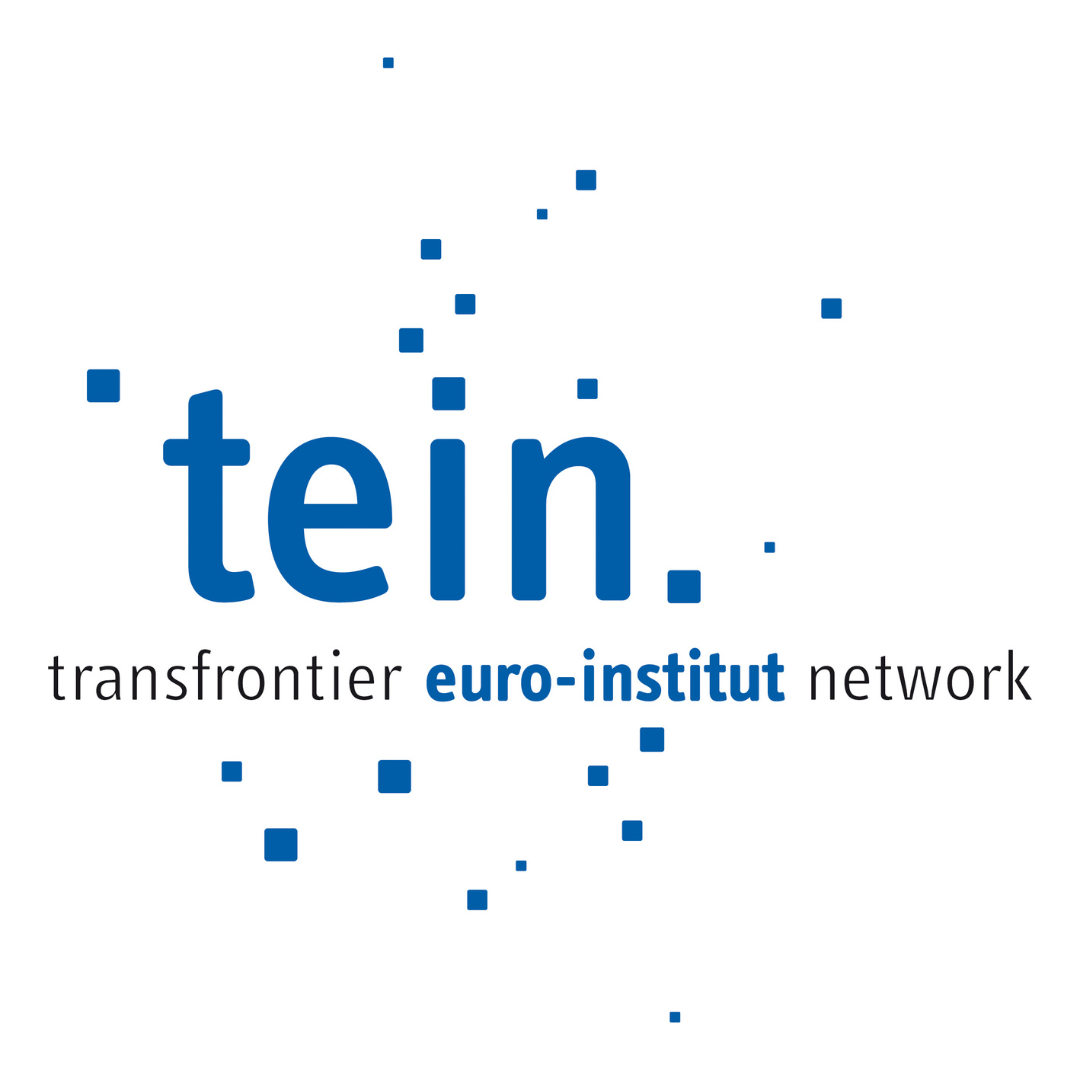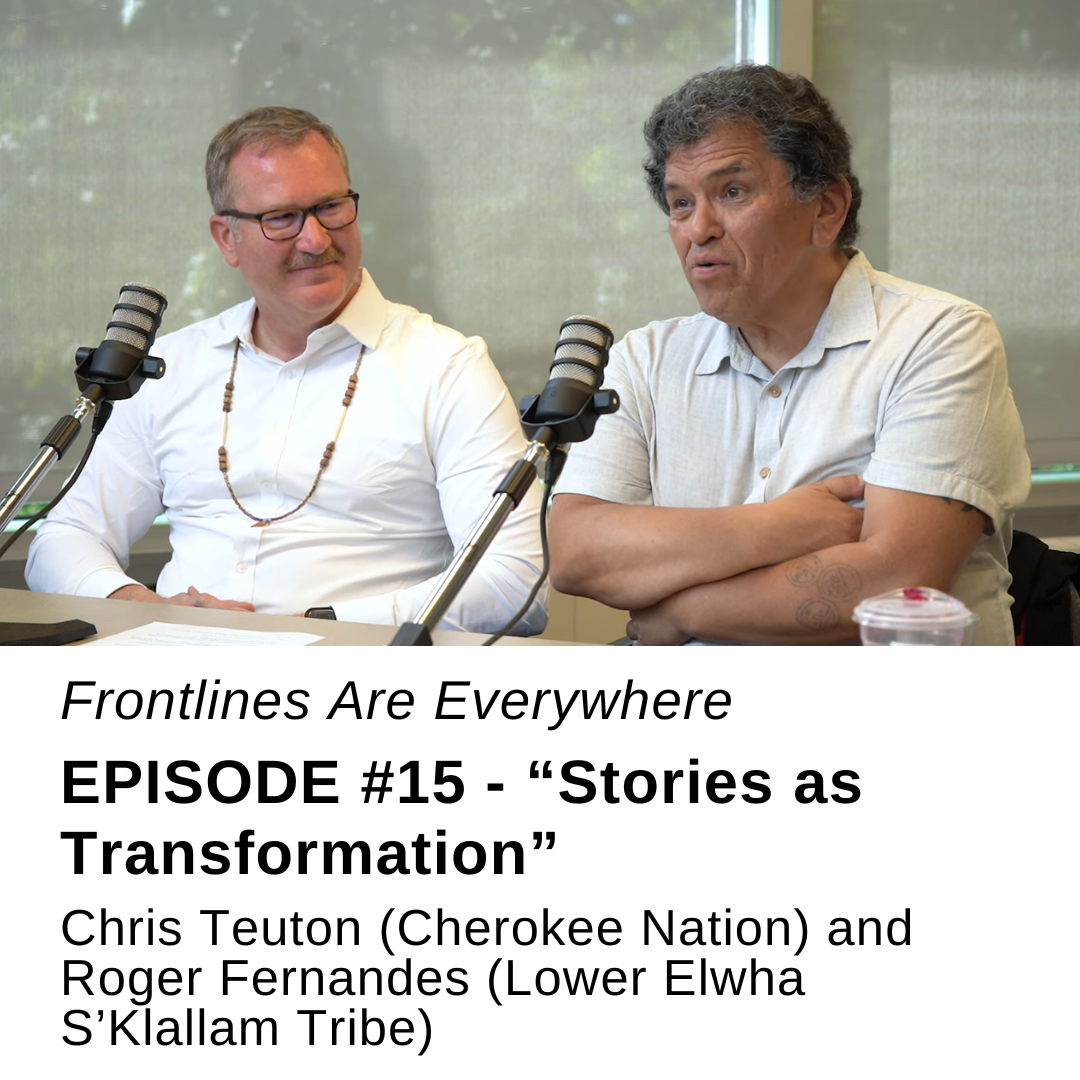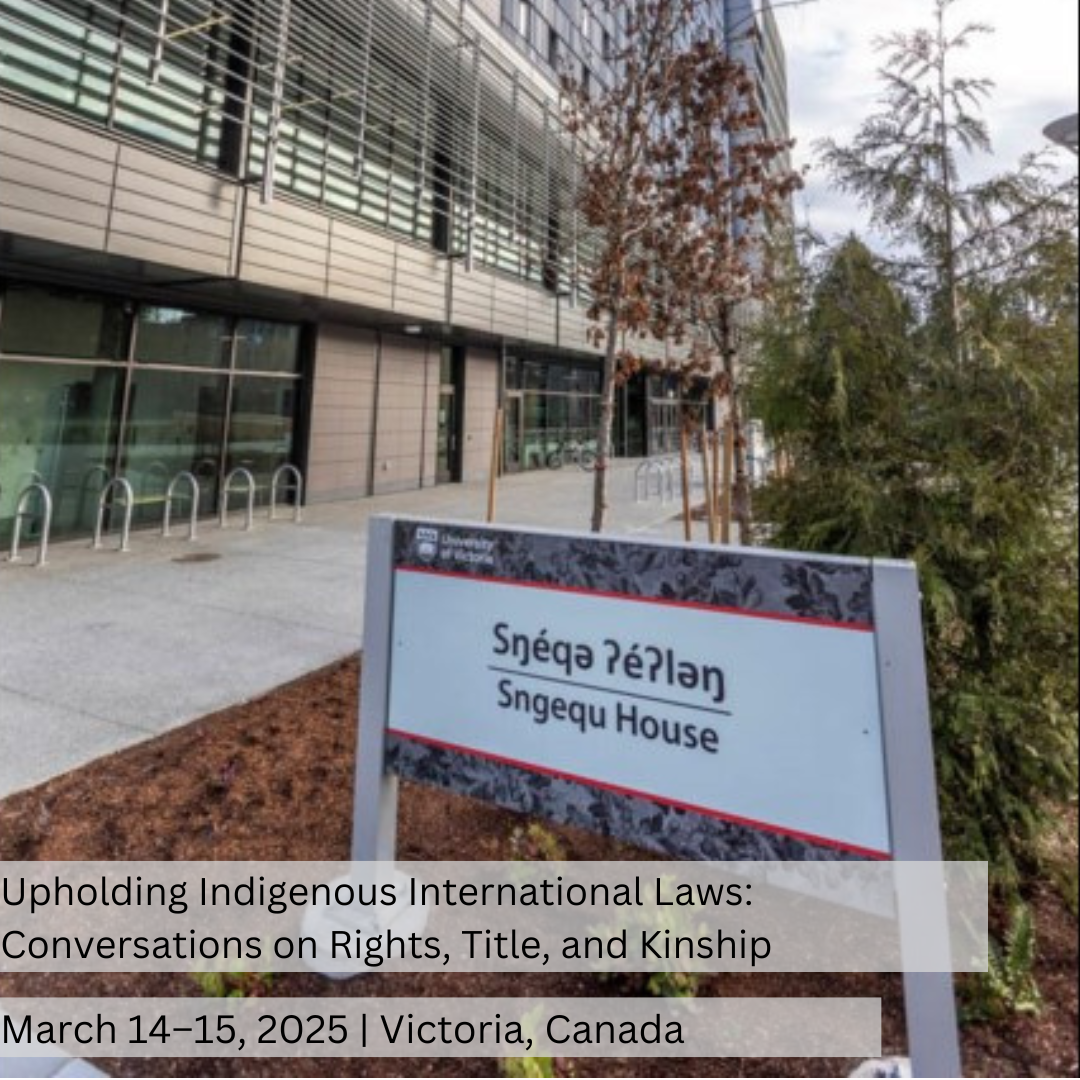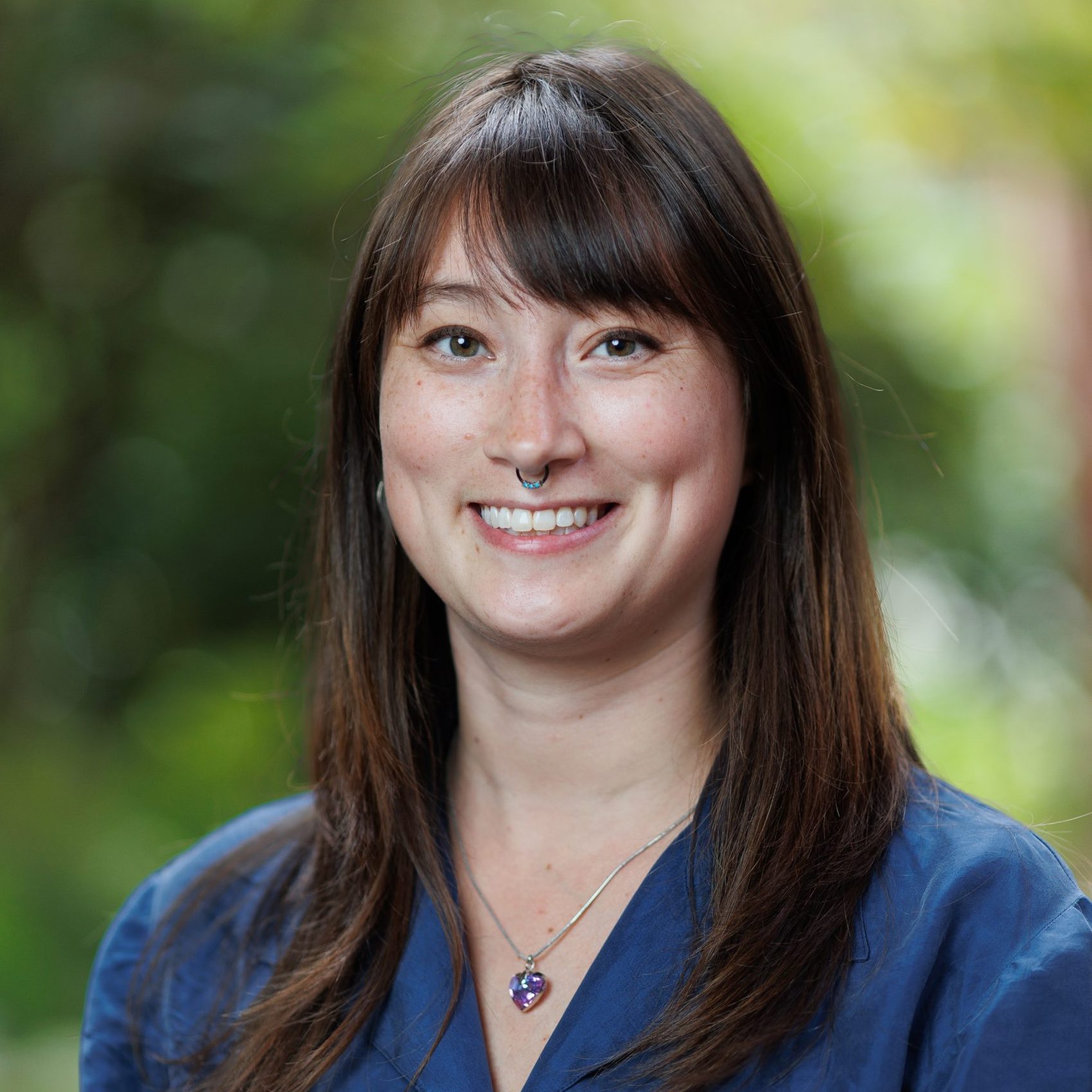#3 Frontlines Are Everywhere — Sacred Rage and Love for Land, Culture, & Community
featuring ‘Cúagilákv / Jess H̓áust̓I of Haíɫzaqv (Heiltsuk) Nation (Executive Director of Qqs Project Society and the Co-Lead of Right Relations Collaborative)
Jeff Corntassel, citizen of the Cherokee Nation, sits down with ‘Cúagilákv / Jess H̓áust̓I of Haíɫzaqv (Heiltsuk) Nation. Jess is a parent, poet, and land-based educator living in Bella Bella. They are the Executive Director of Qqs Project Society and the Co-Lead of Right Relations Collaborative.
Jess talked about leadership, the inseparability of body & land, and sacred role of rage in activism. They also talked about the impact of the 2016 Nathan E. Stewart tugboat oil spill that released 110,000 litres of diesel and oil into Haíɫzaqv Nation’s harvesting territory, and their healing in relation to land & waters. They also talked about the resurgence of language initiatives and local food revitalization happening in their community.
Jess concludes the podcast by reading from their debut poetry collection, Crushed Wild Mint.
You can find copies of Crushed Wild Mint here.
Listen to Episode Three of the Frontlines Are Everywhere podcast on YouTube.
The Frontlines Are Everywhere podcast takes a critical look at world politics and Indigenous nationhood by discussing Indigenous-led resurgence and activist movements, Indigenous trade networks, Indigenous climate action and the formation of new alliances that transcend colonial state borders among other topics. Dr. Jeff Ganohalidoh Corntassel will be interviewing Indigenous scholars, activists, artists and knowledge holders from across Turtle Island and around the world in order to gain insight into how Indigenous peoples practice their own forms of Internationalism through intimate connections to land/water, culture and community.

Chilly communities in Atlantic Canada: While formal supports for immigrants are plentiful, community inclusion remains
July 2019 – Vol 1, No. 6.

What Does It Mean to be a Binational Region in a Globalized World? Cross-Border Innovation and Community Prosperity in Southern Ontario and Western New York
Kathryn Freidman | BIG Policy Reports
The cross-border region encompassing western New York and southern Ontario is in transition. Rather than maintaining a status quo outlook forged from decades of decline in population, employment and GDP, leaders on each side of the border are leveraging assets to strengthen human capital and create purposeful transformation to foster sustainable communities, creativity and innovation. Buffalo Niagara is targeting investment in initiatives such as the build-out of the Downtown Medical Corridor; investment in cultural/heritage tourism and health sciences innovation; and stewardship of the Great Lakes. In 2015, Buffalo Niagara also was selected as one of several regional site teams for a “Communities that Work” partnership, a workforce development effort aimed toward driving talent-based economic development locally and across the country. At the same time, parallel efforts are taking place in southern Ontario. Just a stone’s throw away, leaders in the Niagara Region and City of Hamilton are similarly committed to increasing economic opportunity and creating well-paying jobs by strengthening innovation (e.g., health sciences), natural heritage (Niagara Falls and Great Lakes) and cultural asset (tourism) strategies – all with an eyetoward workforce development and creating healthy, vibrant, prosperous communities.
Kathryn Freidman, Director of Cross-Border and International Research, University at Buffalo (SUNY)

Beyond Borders. Culture, Language, and Identity in European Integration
Beyond Borders. Culture, Language, and Identity in European Integration
Organized by Universitat de Girona (UdG) | Transfrontier Euro-Institut Network (TEIN)
October 21 and 22, 2025
Girona. Faculty of Arts, Universitat de Girona.
The conference Beyond Borders: Culture, Language, and Identity in European Integration will bring together experts, politicians, academics, and community members to reflect collectively on the following aspects:
- How broad cultural expressions (from languages, literature, history, tourism, gastronomy, landscape, etc.) can foster mutual understanding and cooperation between neighboring regions.
- Success (and failure) stories where culture has been a driving force for cross-border cooperation.
- How different identities can enrich cooperation initiatives.
- Strategies to promote, question, hybridize, and preserve cultural and linguistic identities in border regions and throughout Europe.
- The role of languages as a vehicle for communication and cultural exchange.
- The role of shared cultural heritage. Successful cross-border cultural projects.
- Educational programs that promote multilingualism, intercultural understanding, and cross-border cultural exchange.
- How local, regional, and national identities can coexist with a broader European identity.
The conference is jointly organized by the University of Girona (UdG) and the Transfrontier Euro-Institut Network (TEIN), with the support of the Borders in Globalization-21st Century project.

#15 Frontlines Are Everywhere | Chris Teuton and Roger Fernandes, Stories as Transformation
featuring Chris Teuton (Cherokee Nation) and Roger Fernandes (Lower Elwha S’Klallam Tribe)
In this episode, Jeff is joined by Chris Teuton from the Cherokee Nation and Roger Fernandes from the Lower Elwha S’Klallam Tribe. They discuss storytelling as a powerful tool for transformation, childhood education, and connecting with community teachings – while sharing a few stories along the way!

with Irasema Coronado, Ph.D. (Director and Professor School of Transborder Studies, Arizona State University) and Hector Antonio Padilla Delgado (Professor of Political Science, Universidad Autonoma de Ciudad Juarez) | Zoom and University of Victoria, BC | 10AM PST, April 28, 2025
As shifting migration policies and enforcement at the U.S.-Mexico border have rendered the pursuit of the American Dream increasingly inaccessible, a growing number of migrants have turned to Mexico as a place of permanent settlement rather than transit. This paper examines the experiences of 24 migrants from diverse national backgrounds who, after being unable to enter the United States, have made Ciudad Juárez their home. Drawing on qualitative interviews, the study explores processes of integration through interrelated domains: navigating Mexican immigration laws and policies, employment, housing, and the experiences of children in the immigrant integration process. The findings illuminate how migrants navigate local systems and construct new senses of belonging in a context marked by uncertainty, opportunity, and resilience. In documenting these lived experiences, the paper proposes a redefinition of the “Mexican Dream” as a framework emerging from migrants’ own narratives—one rooted in stability, community, and the pursuit of a dignified life in Mexico. This research contributes to broader discussions on south-south migration, urban integration, and the transformation of Mexico’s role within regional migration systems.

Across the Canada–United States Border
April 2, 2025 | Seattle, WA
On April 2, 2025, at the Canadian Consulate in Seattle, WA, USA, as a shoulder of the Association of Borderlands Studies annual ‘Legacy Conference’ (held with the World Social Science Association), BIG_Lab held a one-day workshop looking at relevant regional border issues from a security perspective. This small group of approximately 25 people, was made up of a mix of persons from academics, industry, and government. Our goal was to examine regional border issues from a multifaceted lens and explore options for improving cross border relationships. There were two panels, one on digital identity, and a second on E-commerce, given the significance of Amazon to the Seattle business community. These were round table discussions, with all questions scripted in advance, and Chatham House rules applied.

Indigenous Internationalism and Kinship Diplomacy: The Relational Dimensions of Indigenous International Law
Andrew Ambers and Jeff Corntassel | Rooted: A Publication on Indigenous Law
Published in Rooted: A Publication on International Law, Vol. 3 No. 2
Enactments of Indigenous internationalism, which entail honoring relationships between nations (including plant and animal nations and other more-than-human relations) and are initiated, recalled, and reaffirmed through treaties, alliances, rights, territorial ownership and access, trade relations, and other webs of relational affiliations, contribute to and indeed constitute a diplomatic kinship meshwork. Our engagement with Indigenous internationalism is concerned with theory-building as it relates to conceptualizing kinship as a critical source of Indigenous international law and articulating how we can identify these laws and ethics in expressions of internationalism to uplift, honour, and perpetuate Indigenous sovereignty and self-determining authority. We examine how kinship meshworks order and are ordered by Indigenous international law through expressions of Indigenous internationalism, which exist beyond state borders and are functions of Indigenous diplomacies that honor Indigenous legal orders within a multiplicity of lawful and rights-bearing relations. We identify how understanding Indigenous internationalism requires overturning statist, patriarchal, and extractive visions of diplomacy, sovereignty, and international relations.
Andrew Ambers is from the Kwakwaka’wakw Nation, specifically the ‘Namgis and Ma’amtagila First Nations. He holds a Bachelor of Arts (Hons) from the University of Victoria, and he is currently a Juris Doctor (JD) and Juris Indigenarum Doctor (JID) Candidate at the University of Victoria’s Faculty of Law. Ambers contributes to various Indigenous research projects on Indigenous law, sovereignty, and Aboriginal rights, and he holds advisory role with Indigenous organizations in British Columbia. Ambers is currently working on topics related to Indigenous international law, aquatic Aboriginal Title, coastal Indigenous trade and diplomacy, Indigenous intellectual and real property rights, and the international dimensions of Indigenous rights in Canada, the United States, and beyond.
Jeff Corntassel is a writer, teacher, and father from the Cherokee Nation. As Professor and Acting Director in Indigenous Studies at the University of Victoria, his research and teaching interests focus on “Everyday Acts of Resurgence” and the intersections between Indigenous internationalisms, resurgence, climate change, gender, and community well-being. Jeff situates his work at the grassroots with many Indigenous led community-based programs and initiatives ranging from local food movement initiatives, land-based renewal projects to gendered colonial violence and protection of homelands. He is currently completing work for his forthcoming book on Sustainable Self-Determination, which examines Indigenous climate justice, food security, and gender-based resurgence.

Upholding Indigenous International Laws: Conversations on Rights, Title, and Kinship
March 14–15, 2025 | University of Victoria
This gathering of Indigenous knowledge-holders and legal scholars examined the ways that Indigenous nations and communities invoke Indigenous international law to confront ongoing colonization and assert self-determining authority. Amidst grassroots community activism as well as advancing Aboriginal title and jurisdiction, Indigenous peoples are acting on their community laws and protocols to affirm rights and title, rematriate our lands, waters and bodies, and honor kinship relations. This two-day colloquium promoted meaningful conversations around the ways that Indigenous nationhood and internationalism are practiced and adapted to confront contemporary challenges and create meaningful strategies for Indigenous nations.
Click below to view the full program.

Junior Resident Fellow
Caitlin Quist
Caitlin Quist is a Master of Public Administration (MPA) student at the University of Victoria. Caitlin completed a Bachelor of Arts in Economics & Political Studies with a minor in Geography at Thompson Rivers University. Additionally, she has been working to complete a diploma in Restoration of Natural Systems at the University of Victoria, part-time. She worked in the non-profit sector for several years prior to beginning her graduate studies. Her research interests include ecological governance, food systems, water and watershed governance, and community economic development.
She is a Graduate Research Assistant with BIG Lab, supporting the work of the BIG Dyads Database.

